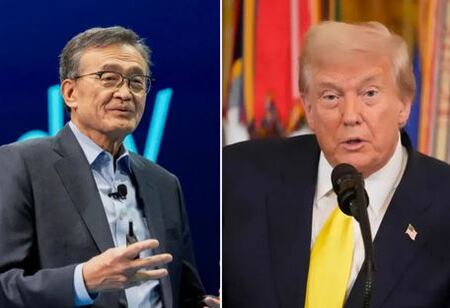
President Trump Calls Intel CEO a 'Success' After Meeting

 The CEO of Intel, Lip-Bu Tan, had a meeting with President Donald Trump in a bid to alleviate concerns regarding his leadership of the struggling chip manufacturer, only days after the president demanded his immediate resignation over alleged connections to China.
The CEO of Intel, Lip-Bu Tan, had a meeting with President Donald Trump in a bid to alleviate concerns regarding his leadership of the struggling chip manufacturer, only days after the president demanded his immediate resignation over alleged connections to China.
Following their afternoon discussion at the White House, Trump expressed on Truth Social that his conversation with Tan was "very interesting," although he provided no further details. He indicated that Tan and members of his Cabinet would convene next week to "present suggestions to me," praising Tan's "success and rise" as an incredible story.
Trump’s message seemed to indicate a shift in his perspective regarding any possible national security threats associated with Tan, 65, who took over as Intel’s CEO in March. Last week, Trump had called for Tan's resignation, referencing his previous investments in Chinese firms, marking one of the few instances where the president sought to directly influence leadership at a significant publicly traded enterprise.
Also Read: Japan's Space Endeavors: From a Peaceful Stance to a Space Power
The president's remarks urging a leadership change at Intel – where he labeled Tan as "highly CONFLICTED" in need of stepping down – drew backlash from segments of the business world, who argued that the president was overstepping his authority by intervening in corporate governance.
Intel noted that Tan and Trump engaged in a "candid and constructive discussion on Intel's commitment to bolstering US technology and manufacturing leadership."
The company did not address inquiries about whether Trump had brought up concerns regarding Tan's apparent ties to China during their conversation.
This critical dialogue between the president and the Intel CEO occurred at a pivotal time for the beleaguered American semiconductor firm, which has fallen significantly behind its competitors. The company had ousted its former CEO, Patrick Gelsinger, last year and appointed Tan, who had previously served on its board, in March to help revitalize the company.
Recently, Tan announced that Intel would be reducing its workforce by an additional 15 percent. He also noted that the company aims to penetrate the AI chip market, reclaim its share of personal computer chips, and enhance the efficiency of its chip manufacturing processes.
Also Read: The New Age Response to Cyberattacks: Is Data Privacy at Risk?
Intel has garnered attention as a principal beneficiary of the CHIPS Act, a bipartisan initiative enacted during the Biden administration aimed at revitalizing domestic semiconductor production. The company received $8.5 billion in federal funding to establish facilities in Arizona, Ohio, and New Mexico. However, its operational challenges have sparked doubts regarding its capability to fulfill these projects, and Trump has expressed criticism of the CHIPS Act.

